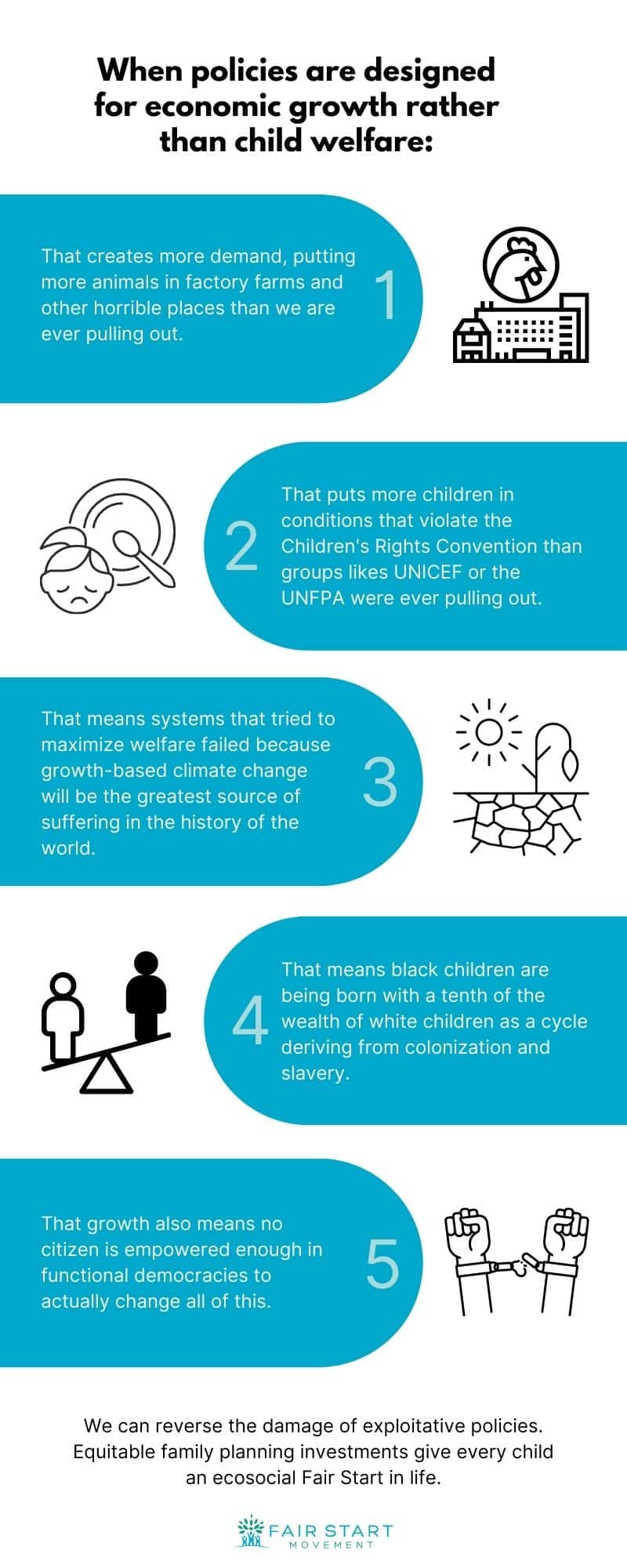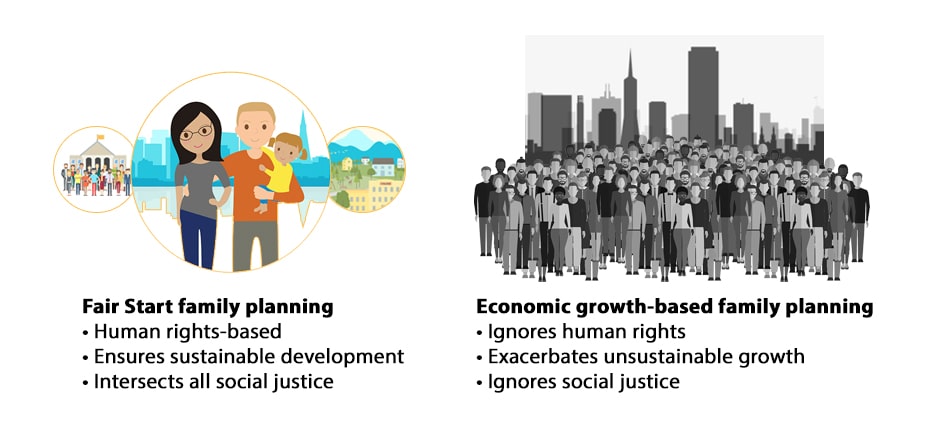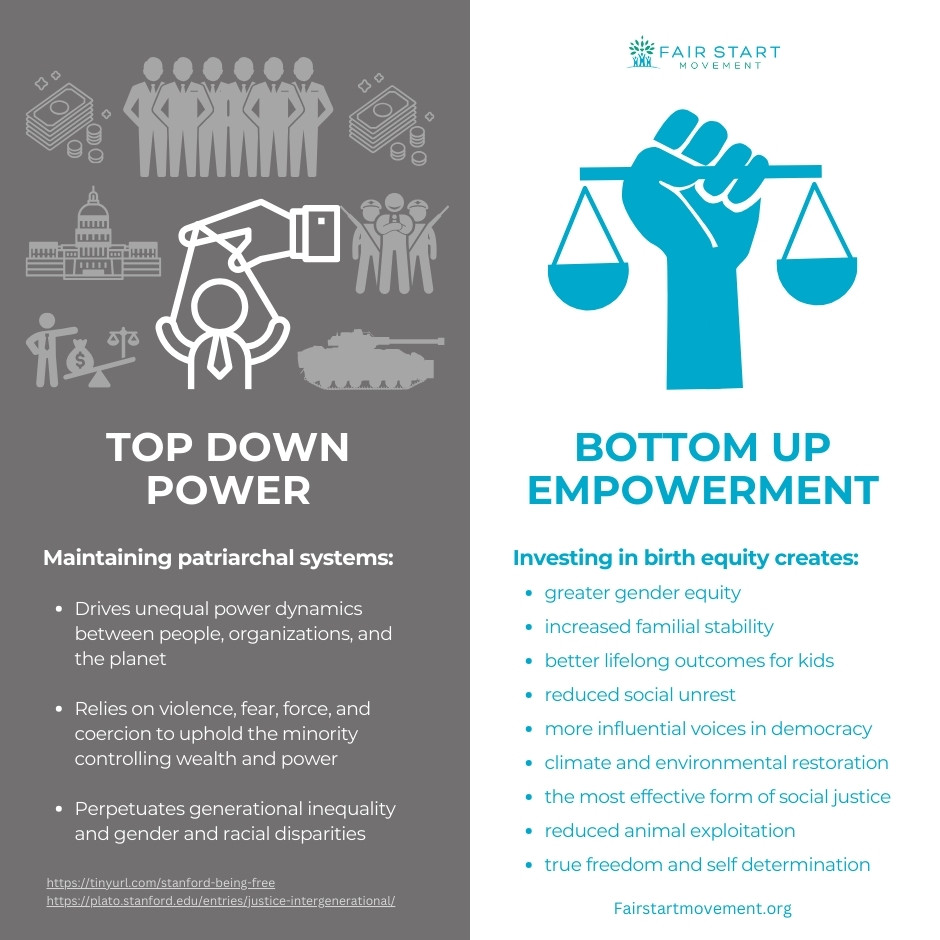Free people feel obligated to follow the law because their legal system first empowered them – through birth and development conditions, with with a role in making the law and and thus ensuring the capacity for each to choose who has influence (including climatologically) or power over them. That is the core of legitimacy, or the creation of fundamental power relations that look more like a town hall of citizens than a shopping mall of workers and consumers controlled by owners. By definition, freedom among equals first means birth and development against ecocentric or natural ecologies in conditions that ensure equity of opportunity and an influential voice in deciding – and thus legitimating – the rules under which one must live.
A young Nigerian attorney, Esther Afolaranmi, is overseeing the key move to ensure that capacity, a complaint before the United Nations Human Rights Council that would ensure universal self-determination through one simple change – basing political legitimacy on children’s rights. This would ensure the right of young women to family planning incentives/entitlements that would enable ecosocial birth and developmental equity, ensuring they have any children only at a time, place and with resources that ensure those children will thrive based on very specific metrics, which would also constitute the most just form of climate reparations.
Such a change would ensure that we do not benefit from a system at deadly cost to others, a fact that have driven some to desperate acts.
And because being free in this sense is constitutive, or comes first, those women would have a claim to such resources that overrides the existing property rights to extreme wealth that was made at cost to future generations. The policies that would keep this wealth in place are illegitimate governance because our generations can’t get the benefit of future generations’ political obligation, not to violently target us for reparations required by the deadly climate catastrophe for example, because we never met our obligations to them – starting with children’s rights. Expecting to benefit from others without paying the costs of freedom – truly investing in kids – is proceeding from a false premise.
If a young mother were charged with trespassing in making the demand for birth equity reparations, could she challenge it – and expect a jury to side with her – because the state cannot limit access to property without first empowering (actually or physically constituting) its people to be involved in the making of such property rules, i.e. empowering them through just the sort of constitutive discourse in which she seeks to engage? How do we every get to governance by the people without elevating her pre-political right above the process-based rule of trespass? Do we really choose to constitute our relations via top-down force in a system run by men, versus a system of bottom-up empowerment run by women, via the act of care? Her act would be fundamentally liberating, and the best explanation of political obligation, because free people will start by limiting and decentralizing the influence others have over them.
I recently had one wealthy, white funder tell me that “fair start” sounded like ensuring their grandchild would be born in hospital conditions like those in Kampala, rather than in Palo Alto, and they wanted to avoid that. They felt this way, even though they had made their wealth through a system that externalized its costs, and relied on family policies that fundamentally allowed that externalizing, with deadly impacts on Uganda and the children living there. This was the same cost-externalized wealth, and policy control, that had also ensured this funder’s daughter would be the executive director of their foundation.
The funder urged me to do “make work” and low impact window dressing, as other funders in nonprofits urge their employees to do, rather than see the fundamental issue. They insisted on framing the issue as “population” to avoid discussions of equity as equal and influential shares in a democracy – equal control, through law, to limit and thereby free us from those who would have influence – including climatologically or through irresponsible parenting – over us. They did this all while using that same money to decoy audiences away from equity with that same focus on overpopulation, and towards geoengineering solutions that would make them a savior in the climate crisis driven by policies that benefitted the funder at deadly cost to others.
Telling stories like this, and taking other actions to make examples of the funder, could model the trolley problem in ethics, change what we mean by the word legitimate, and also free massive resources, minimizing climate deaths. Funders who want to exploit birth positionality for their own benefit go beyond influencing nonprofits, and control how reporters cover the climate crisis, and the solutions politicians offer.
Many of written about this phenomenon, but now it is costing millions of lives.
This is an existential question. Who should we be? Persons that leave extreme wealth where it is, made at cost to future lives because the wealthy got the benefit of seemingly legitimate governance without actually paying the costs of children’s rights, or freedom fighters who move it and save countless lives? Many are already giving voluntarily in this way, leading the way for others.

What are we doing to ensure the conditions in which children are born and raised, including their environment and role models, are being improved so as not to undo the benefits of the work we are promoting? What minimum protections for children and animals do we require for political systems to be legitimate? Can we admit that our failure to ensure such minimums through a correct system of entitlements, historically, is now killing millions of those least responsible for the climate catastrophe?
Here are two legal moves we can all make for truth and justice:
- Back new Tell the Truth ESG reporting requirements geared around the actual harm the climate catastrophe is doing to the most vulnerable. Current ESG reporting requirements are designed to benefit rich white kids at cost to the global majority and nonhumans, and to minimize climate reparations – including by hiding the overriding right to ensure resources are prioritized for ecosocial birth equity. It’s called the ImpactScam: Many organizations raised money while making policy choices that benefitted their leadership at deadly cost to others, choices that – given the climate crisis – did more harm to the causes they promoted than they were doing good.
- Stand behind Esther’s work at United Nations Human Rights Council that would ensure universal self-determination through one simple change: Basing all political legitimacy on children’s rights, with the right of young women to family planning incentives/entitlements ensuring they have any children only at a time, place and with resources that ensure those children will thrive based on very specific metrics, which would also constitute the most just form of climate reparations. This legal process is the beginning of a fundamental sovereignty process of exact intergenerational reparations that would have truly primary jurisdiction.



